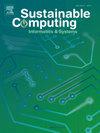Exploring artificial intelligence potential in solar energy production forecasting: Methodology based on modified PSO optimized attention augmented recurrent networks
IF 5.7
3区 计算机科学
Q1 COMPUTER SCIENCE, HARDWARE & ARCHITECTURE
引用次数: 0
Abstract
The use of renewable power sources is vital for reducing the world’s reliance on limited fossil fuels, reducing the impact on climate and mitigating the losses associated with power transmission. However, renewable sources such as solar power, often suffer from fluctuations in production due to their heavy reliance on weather conditions. This can have a significant impact on their reliability, as well as an impact on the power grid. Nevertheless, these issues could be mitigated by utilizing powerful and robust forecasting models, allowing for more efficient planning and fuller utilization of the produced power. This work explores the use of artificial intelligence (AI) in order to predict the yield of photovoltaic-generated energy. Different artificial neural network architectures are explored, including recurrent neural network (RNN), gated recurrent unit (GRU), and the long short-term memory (LSTM). Additionally, attention mechanism is integrated into the best-performing model to help further improve its performance. To ensure favorable outcomes, an adapted variant of the particle swarm optimization (PSO) is introduced to optimize hyper-parameter settings of each model. Simulations with real-world data showcased promising results while the rigorous statistical analysis confirmed that the observed improvements are statistically significant. The best-performing models were subjected to feature importance analysis to help future endeavors, as well as data collection efforts. The best performing models attained an impressive normalized mean square error (MSE) and coefficient of determination () of 0.007240 and 0.894693, respectively, suggesting strong perspective for real world applications. Nonetheless, the introduction of attention mechanism did not provide further improvements to the best performing model. Lastly, this study confirmed that the modifications made to the baseline PSO strengthened the original approach, as it statistically significantly outperformed other metaheuristics.
探索人工智能在太阳能生产预测中的潜力:基于改进粒子群优化关注增强循环网络的方法
可再生能源的使用对于减少世界对有限的化石燃料的依赖,减少对气候的影响以及减轻与电力传输相关的损失至关重要。然而,像太阳能这样的可再生能源,由于严重依赖天气条件,经常受到产量波动的影响。这可能会对它们的可靠性产生重大影响,也会对电网产生影响。然而,这些问题可以通过利用强大和可靠的预测模型来减轻,从而允许更有效的规划和更充分地利用所产生的电力。这项工作探讨了人工智能(AI)的使用,以预测光伏发电的产量。探讨了不同的人工神经网络结构,包括递归神经网络(RNN)、门控递归单元(GRU)和长短期记忆(LSTM)。此外,将注意力机制集成到最佳表现模型中,以帮助进一步提高其性能。为了保证较好的结果,引入了自适应粒子群优化算法(PSO)来优化每个模型的超参数设置。真实世界数据的模拟显示了有希望的结果,而严格的统计分析证实了观察到的改进在统计上是显著的。对表现最好的模型进行特征重要性分析,以帮助未来的努力,以及数据收集工作。表现最好的模型分别获得了令人印象深刻的归一化均方误差(MSE)和决定系数(R2),分别为0.007240和0.894693,这为现实世界的应用提供了强有力的前景。然而,注意机制的引入并没有对最佳表现模型提供进一步的改进。最后,本研究证实,对基线PSO的修改加强了原始方法,因为它在统计上显著优于其他元启发式方法。
本文章由计算机程序翻译,如有差异,请以英文原文为准。
求助全文
约1分钟内获得全文
求助全文
来源期刊

Sustainable Computing-Informatics & Systems
COMPUTER SCIENCE, HARDWARE & ARCHITECTUREC-COMPUTER SCIENCE, INFORMATION SYSTEMS
CiteScore
10.70
自引率
4.40%
发文量
142
期刊介绍:
Sustainable computing is a rapidly expanding research area spanning the fields of computer science and engineering, electrical engineering as well as other engineering disciplines. The aim of Sustainable Computing: Informatics and Systems (SUSCOM) is to publish the myriad research findings related to energy-aware and thermal-aware management of computing resource. Equally important is a spectrum of related research issues such as applications of computing that can have ecological and societal impacts. SUSCOM publishes original and timely research papers and survey articles in current areas of power, energy, temperature, and environment related research areas of current importance to readers. SUSCOM has an editorial board comprising prominent researchers from around the world and selects competitively evaluated peer-reviewed papers.
 求助内容:
求助内容: 应助结果提醒方式:
应助结果提醒方式:


